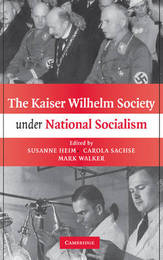
|
The Kaiser Wilhelm Society under National Socialism
Hardback
Main Details
| Title |
The Kaiser Wilhelm Society under National Socialism
|
| Authors and Contributors |
By (author) Susanne Heim
|
|
By (author) Carola Sachse
|
|
By (author) Mark Walker
|
| Physical Properties |
| Format:Hardback | | Pages:502 | | Dimensions(mm): Height 229,Width 152 |
|
| ISBN/Barcode |
9780521879064
|
| Classifications | Dewey:509.43/0904 509.430904 |
|---|
| Audience | | Professional & Vocational | |
|---|
|
Publishing Details |
| Publisher |
Cambridge University Press
|
| Imprint |
Cambridge University Press
|
| Publication Date |
27 April 2009 |
| Publication Country |
United Kingdom
|
Description
During the first part of the twentieth century, German science led the world. The most important scientific institution in Germany was the Kaiser Wilhelm Society, including institutes devoted to different fields of scientific research. These researchers were not burdened by teaching obligations and enjoyed excellent financial and material support. When the National Socialists came to power in Germany, all of German society, including science, was affected. The picture that previously dominated our understanding of science under National Socialism from the end of the Second World War to the recent past - a picture of leading Nazis ignorant and unappreciative of modern science and of scientists struggling to resist the Nazis - needs to be revised. This book surveys the history of Kaiser Wilhelm Institutes under Hitler, illustrating definitively the cooperation, if not collaboration, between scientists and National Socialists in order to further the goals of autarky, racial hygiene, war, and genocide.
Author Biography
Suzanne Heim is project coordinator of the documentation project "The Persecution and Extermination of the European Jews by Nazi Germany 1933-1945" at the Institute for Contemporary History in Munich and Berlin, and she has previously been the Charles Revson Fellow at the U.S. Holocaust Memorial Museum, Washington, DC, and Research Director of the Max Planck Society-s Research Program on the History of the Kaiser Wilhelm Society in the National Socialist Era. She is the author of Plant Breeding and Agrarian Research in Kaiser-Wilhelm-Institutes 1933-1945: Calories, Caoutchouc, Careers (2008) and (with Gotz Aly) Architects of Annihilation: Auschwitz and the Logic of Destruction (2003) and editor of Autarkie und Ostexpansion: Pflanzenzucht und Agrarforschung im Nationalsozialismus (2002). Carola Sachse is full professor of contemporary history at the University of Vienna and, from 2000 to 2003, served as Research Director of the Max Planck Society-s Research Program on the History of the Kaiser Wilhelm Society in the National Socialist era. She is the editor (with Mark Walker) of Politics and Science in Wartime: Comparative Perspectives on the Kaiser Wilhelm Institutes (2005) and Die Verbindung nach Auschwitz: Biowissenschaften und Menschenversuche an Kaiser-Wilhelm-Instituten (2003) and author of Der Hausarbeitstag: Gerechtigkeit und Gleichberechtigung in Ost und West 1939-1994 (2002), Siemens, der Nationalsozialismus und die moderne Familie: Eine Untersuchung zur sozialen Rationalisierung in Deutschland im 20. Jahrhundert (1990), and Industrial Housewives: Women's Social Work in the Factories in Nazi Germany (1987). Mark Walker is John Bigelow Professor of History, Department of History, Union College, Schenectady, in New York and has received grants from the German Academic Exchange Service, the Social Science Research Council, and the Humboldt Foundation. He is the author of German National Socialism and the Quest for Nuclear Power, 1939-1949 (1989) and Nazi Science: Myth, Truth, and the German Atom Bomb (1995), and he has edited (with Monika Renneberg) Science, Technology, and National Socialism (1993), Science and Ideology: A Comparative History (2003), and (with Dieter Hoffmann) Physiker zwischen Autonomie und Anpassung - Die DPG im Dritten Reich (2007).
Reviews'The volume thus gives an excellent overview of the complex entanglement of the Kaiser Wilhelm Institutes and their leading scientists with the National Socialist regime.' The Journal of the BJHS
|